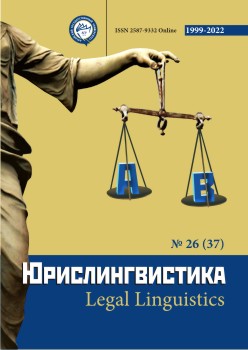Conceptualization of Didacticism in the Communicative Behavior of an Investigator (Based on Detective Stories by Russian and English Authors)
УДК 347:349.2 ББК 67.405.02
Abstract
The article deals with one of the relevant concepts in the speech behavior of an investigator –DIDACTISM. This concept consists of a number of slots that are aimed at the implementation of the educational function in the professional engagement of the investigator. The analysis of interrogations in the works of fiction by Russian and English authors made it possible to identify four concepts that characterize the main illocutions of the verbal behavior of investigators associated with obtaining testimony from the person under investigation. The object of the study was the slots of the DIDACTISM concept, their illocutionary orientation and the degree of representation in the speech of the investigators. A statistical analysis of the obtained results was carried out in order to determine the possible relationship between the personality of an individual detective and his speech behavior in terms of the frequency of using certain slots in the implementation of the concept DIDACTISM. The article also provides a comparative analysis of the features of the implementation of educational intentions in the Russian and English linguistic and cultural communities, as well as the dominant speech behavior of Russian and English investigators, aimed at their pedagogical impact on the person under investigation.
Downloads
Metrics
References
Дубровская Т.В. Судебный дискурс: речевое поведение судьи (на материале русского и английского языков). М., 2010.
Иванова С.В., Артемова О.Е. Сценарный фрейм как когнитивная основа текстов прецедентного жанра «лимерик» / Вопросы когнитивной лингвистики. – 2005. – 3(006). – С. 46-52.
Кикоть В.Я., Столяренко А.М., Беличева С.А., Буданов А.В., Давыдов В.П. Юридическая педагогика. М., 2004.
Красовская О.В. О речевой коммуникации в судебной практике. М., 2008.
Мельник В.В. Искусство доказывания в состязательном уголовном процессе. М., 2000.
Пригарина Н.К. Аргументация судебного дискурса: риторический аспект. Волгоград, 2008.
Новицкий В.А. Теория российского процессуального доказывания и правоприменения. Ставрополь, 2002.
Романов А.А., Малышева Е.В. Особенности актуализации фреймовой структуры несловесного дискурса / Вестник ВГУ. Серия: Лингвистика и межкультурнаякоммуникация. – 2016. – 3. – С. 74-79.
Blank P.D. Interpersonal expectations: Theory, Research, and Applications. Cambridge, 1993.
Cheng H.-Y. SprachlicheVerfahren des WissensmanagementsimKriminalroman. Ein BeitragzurdynamischenTexttheorie (Unpublished doctoral dissertation). Universität Gießen. Gießen, 2011.
Merry S. Study of American lower court litigants. New York, 1990.
O'Barr W.M. Linguistic evidence: Language, power and strategy in the courtroom. New York, 1982.
Tigar M.E. Persuasion: The litigator's art. Chicago, 1999.
Wagner A., Cheng L. Exploring courtroom discourse: The language of power and control. Burlington, 2011.
Copyright (c) 2022 Василий Глушак

This work is licensed under a Creative Commons Attribution 4.0 International License.
The authors, which are published in this journal, agree to the following conditions:
1. Authors retain the copyright to the work and transfer to the journal the right of the first publication along with the work, at the same time licensing it under the terms of the Creative Commons Attribution License, which allows others to distribute this work with the obligatory indication of the authorship of this work and a link to the original publication in this journal .
2. The authors retain the right to enter into separate, additional contractual agreements for the non-exclusive distribution of the version of the work published by this journal (for example, to place it in the university depository or to publish it in a book), with reference to the original publication in this journal.
3. Authors are allowed to post their work on the Internet (for example, in a university repository or on their personal website) before and during the review process of this journal, as this may lead to a productive discussion, as well as more links to this published work (See The Effect of Open Access).











